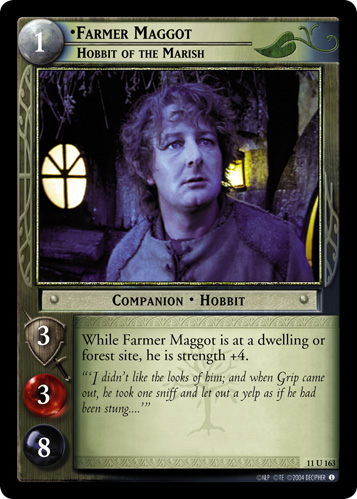Shadows
Back to Main Page |
Black Rider |
| Shadows | |
|---|---|
| ID | 11 |
| Name | Shadows |
| Creator | Decipher |
| Release Date | 2004-11-03 |
| Is Official | yes |
| Platforms | Paper • LotR-O • GEMP • mLOTRO • Tabletop Simulator • Lackey • gccg |
| Notes | |
Shadows is the fourth base set in the Lord of the Rings Trading Card Game, the first set in the War of the Ring Block, and the eleventh set overall. It was released on November 3, 2004, and is the first base set whose release was not directly tied to a film. Instead, cards could represent characters or moments from any of the three Lord of the Rings films.
The set contained 266 cards (60 commons, 60 uncommons, 60 rares, and 86 starter deck-only cards). Five rares and one starter deck-only card from the set had Tengwar versions produced. Starting with Shadows, Decipher no longer printed a foil version of every card; instead, a foil Legends card appeared in one out of every seven packs with the rarity symbol RF.[1] This Legends series contained eighteen cards that also appeared as (non-foil) rares in the set.
Shadows introduced a number of significant changes, including new shadow cultures, a redesigned site path, and the introduction of resistance as an attribute for all companions, not just the ring-bearer. These changes are significant enough that most players view the game in two eras: pre-Shadows (or Movie) and post-Shadows.
Themes and Mechanics[edit]
As noted above, Shadows introduced several significant changes to the mechanics of the game.
The site path was completely redesigned. Sites no longer had site numbers, so any site could be played at any position on the site path. This introduced a new decision point when a player moved to a new site and allowed for new strategic choices, but it came at the cost of reducing the flavour of moving from the shire towards Mount Doom.
In addition to the new rules for the site path, Shadows had a heavy theme of site manipulation and spotting keywords on sites. Site manipulation had previously appeared on individual cards (such as Pathfinder (1C110)
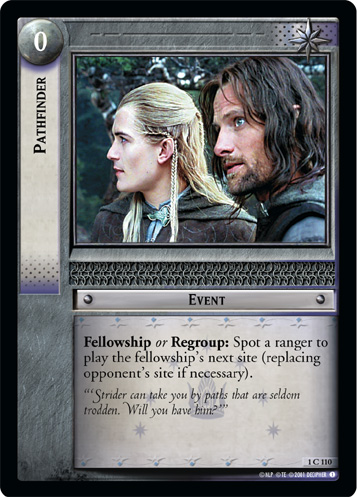 and Úlairë Nelya, Lieutenant of Morgul (1U233)
and Úlairë Nelya, Lieutenant of Morgul (1U233)
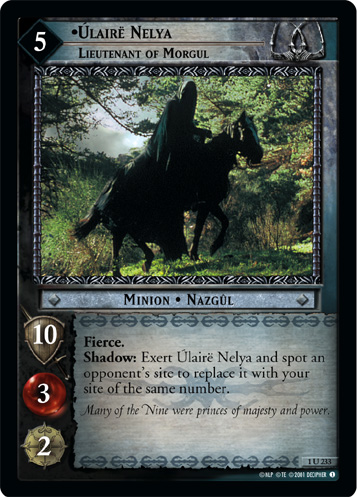 ), and certain cultures had established affinity for site keywords (such as Legolas, Son of Thranduil (3P121)
), and certain cultures had established affinity for site keywords (such as Legolas, Son of Thranduil (3P121)
 and Uruk Assault Band (4R179)
and Uruk Assault Band (4R179)
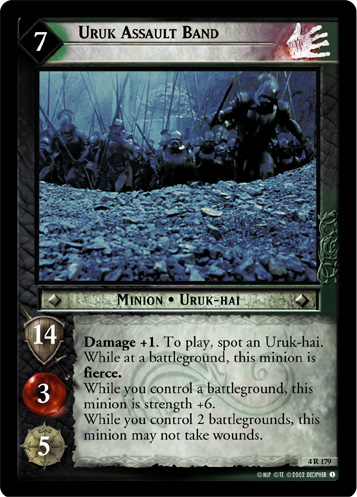 ), but not at the volume present in Shadows.
), but not at the volume present in Shadows.
Companions no longer had signets printed on them. Instead, every companion had a resistance value; companions printed prior to Shadows were retroactively assigned a resistance of 6. Burdens on the ring-bearer now reduced the resistance of every companion in the fellowship, and some cards would only affect companions with a sufficiently high or low resistance value.
After only appearing on only four cards in Return of the King Block and on two cards in Reflections, the ally type was officially retired in Shadows. Previously printed allies could still be played in formats where they were legal, but no new allies were printed, and only two future cards would even reference allies (although they were still affected by cards that referenced "all characters").
Cultures[edit]
In Shadows, Decipher replaced the majority of the shadow cultures. The new cultures were organized around race rather than location or allegiance; for example, all Orcs were now part of the Orc culture, regardless of whether they were from Isengard, Mordor, or Moria. The new cultures were
Men,
Orc, and
Uruk-hai. The Ringwraith culture was renamed
Wraith, but was still considered the same culture from a game perspective, and the
Gollum culture continued without changing.
This change was particularly controversial, since cultural enforcement meant that the new shadow cards were not backwards compatible; shadow cards from the new set could not be played easily with shadow cards from sets 1-10.
Unlike the shadow cultures, free peoples cultures continued unchanged. Shadows had support for all of the previous cultures: Dwarven,
Elven,
Gandalf,
Gollum,
Gondor,
Rohan, and
Shire.
After this set, no new cultures were introduced to the game, although some of the movie-era shadow cultures from sets 1-10 reappeared for individual cards in future sets.
New Loaded Keywords[edit]
Shadows introduced three new loaded keywords: Lurker, Muster, and Toil.
Lurker appeared only on minions, and restricted the order in which the Free Peoples player resolved skirmishes. All non-lurker minions must have their skirmishes resolved before skirmishes involving lurkers may occur. Most Lurker minions have some sort of special ability that can be used to pump other minions up; this keyword thus ensures that they cannot be easily sniped in the first skirmish to prevent using such abilities.
Muster appeared on companions and minions. At the start of the regroup phase, each player may discard cards from hand up to the number of muster characters they own, and then draw the same number of cards. Because this ability was very powerful when repeated consistently for the entire game, companions never had muster unconditionally; muster would either be granted to a companion by an item or condition, or it would only be active in certain situations (for example, if the fellowship was at a certain type of site).
Toil was a numeric keyword that appeared on conditions, events, minions, and possessions. When you play a card with toil N, you could exert any number of characters of that card's culture; for each character you exerted, the card's cost was reduced by N. Most cards had toil 2, but a handful had toil 1 or toil 3.
New Unloaded Keyword[edit]
Shadows introduced one new unloaded keyword, dwelling, which appeared on sites.
Site Keywords[edit]
While unloaded keywords on sites were not new, Shadow's focus on the site path brought increased mechanical attention to these site keywords. Each keyword benefited one or more cultures on multiple cards, as noted below. There were also a handful of individual cards that did not follow the general relationships.
- Battleground - All cultures, especially
Uruk-hai
- Dwelling -
Gandalf,
Shire
- Forest -
Elven,
Gondor,
Shire}},
Wraith
- Marsh -
Gollum (free peoples)
- Mountain -
Dwarven,
Gollum (shadow)
- Plains -
Men,
Rohan
- River -
Elven,
Gondor
- Underground -
Dwarven,
Orc
Starter Decks[edit]
Starting in Shadows, many of the cards in starter packs did not appear in boosters and could only be obtained by buying a starter pack; these cards were all given the rarity symbol S. This included the face cards of the starter packs, which had previously been given a rarity of premium (P), as well as the majority of the sites in the set.
Shadows had four starter decks (one for each shadow culture, except Gollum), the most of any set:
- Aragorn Starter Deck:
Gondor /
Orc
- Eowyn Starter Deck:
Rohan /
Uruk-hai
- Gandalf Starter Deck:
Gandalf /
Wraith
- Legolas Starter Deck:
Elven /
Men
Cycles[edit]
| Shadow Cycles | |||
|---|---|---|---|
| Cycle Name | |||
| Keyword-granting minions | Footman of Dunland (11S82)
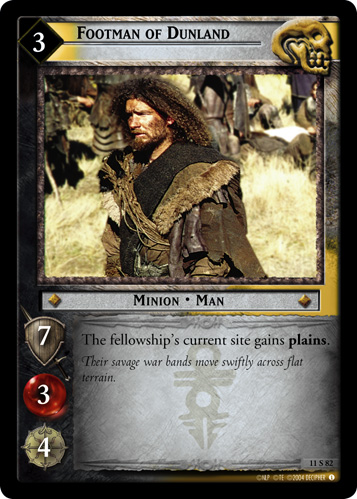
|
Skulking Goblin (11S138)
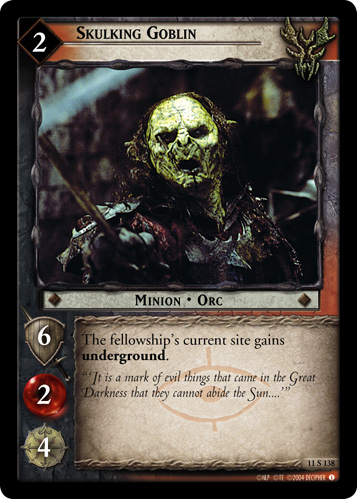
|
Lookout Uruk (11S193)
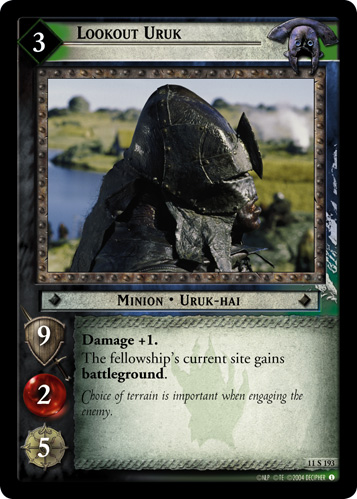
|
| Starter-deck minions that grant a relevant unloaded keyword to the current site of the adventure path. | |||
Reprinted Cards[edit]
- The One Ring, The Ruling Ring (11S2)
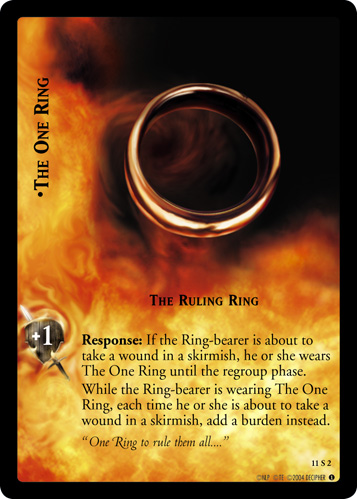 (previously 1C2, 4C2, and 7C1)
(previously 1C2, 4C2, and 7C1) - Rider's Spear (11S153)
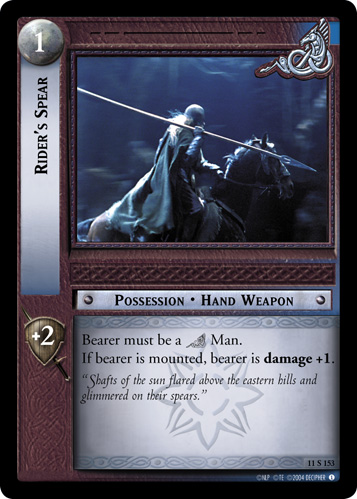 (previously 4C288)
(previously 4C288) - Hobbit Sword (11S166)
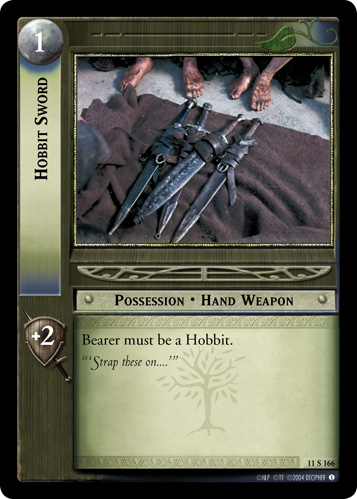 (previously 1C299, 4C306, and 7C319)
(previously 1C299, 4C306, and 7C319) - Drawn to its Power (11S209)
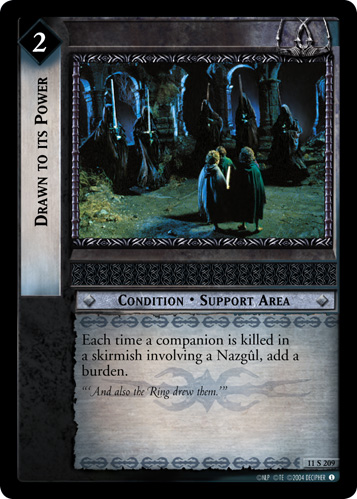 (previously 1U211)
(previously 1U211)
Similar Sites[edit]
With the introduction of the redesigned site path in Shadows, Decipher began reprinting a number of sites from previous sets with modifications to fit the new site path. They generally kept their original name and abilities, but no longer had a site number, and had a lower twilight cost to account for the twilight added by the region. If the site had been a sanctuary, that keyword was removed, since the sanctuary keyword was now granted automatically to any site played in position 3 or 6. Some sites had additional changes, which are noted below.
- Anduin Banks (11U227)
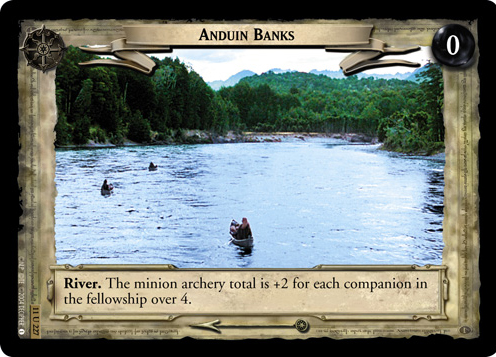 (previously 1C356)
(previously 1C356) - Anduin Confluence (11S228)
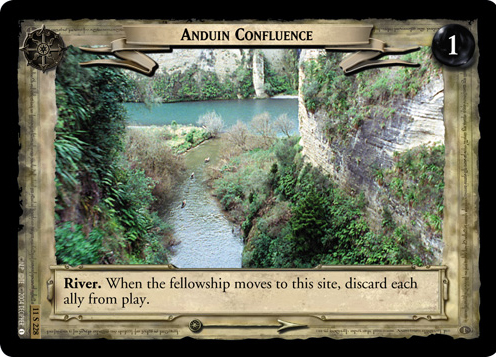 (previously 1U353)
(previously 1U353) - Caras Galadhon (11S231)
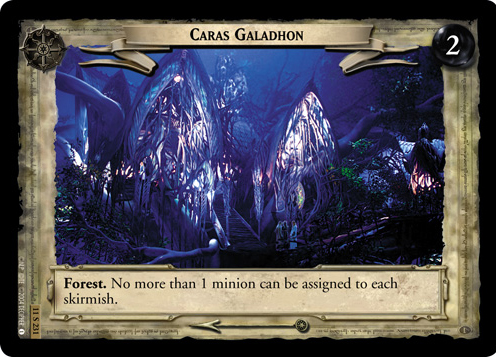 (previously 3U115)
(previously 3U115) - Cavern Entrance (11S232)
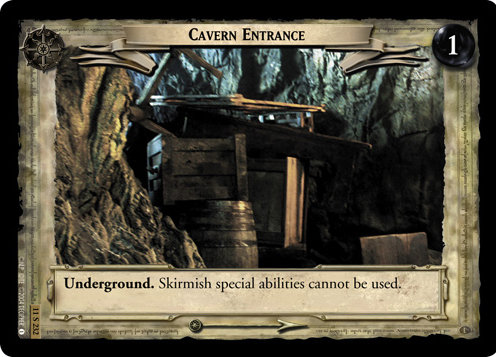 (previously 4U355) - Now only prevents skirmish special abilities; the original also prevented skirmish events.
(previously 4U355) - Now only prevents skirmish special abilities; the original also prevented skirmish events. - East Road (11S236)
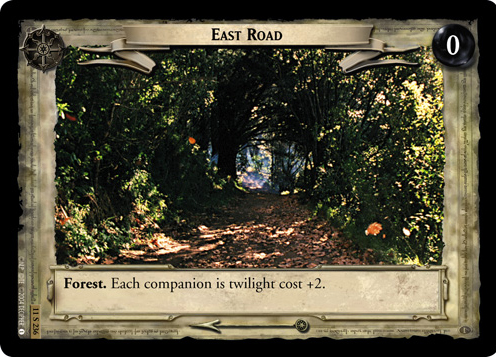 (previously 1U320) - Added the forest keyword.
(previously 1U320) - Added the forest keyword. - Ettenmoors (11S237)
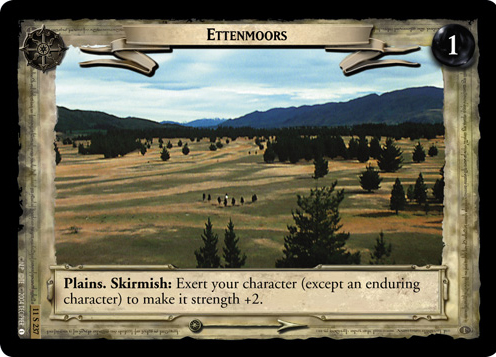 (previously 1C331) - Added an exception for enduring characters, which did not exist when the original was printed.
(previously 1C331) - Added an exception for enduring characters, which did not exist when the original was printed. - Fortress of Orthanc (11S241)
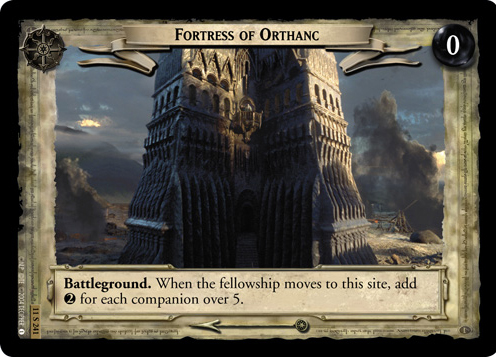 (previously 4U360) - The original added 2 twilight for each companion over 4, while the new version adds twilight for each companion over 5.
(previously 4U360) - The original added 2 twilight for each companion over 4, while the new version adds twilight for each companion over 5. - Green Dragon Inn (11S242)
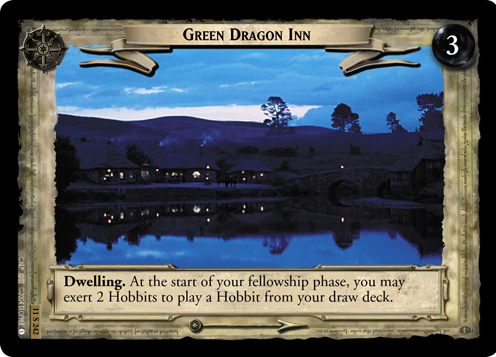 (previously 1U322) - This site changed significantly; it added the dwelling keyword, and allows you to play any hobbit from your draw deck instead of just Sam.
(previously 1U322) - This site changed significantly; it added the dwelling keyword, and allows you to play any hobbit from your draw deck instead of just Sam. - Helm's Gate (11S245)
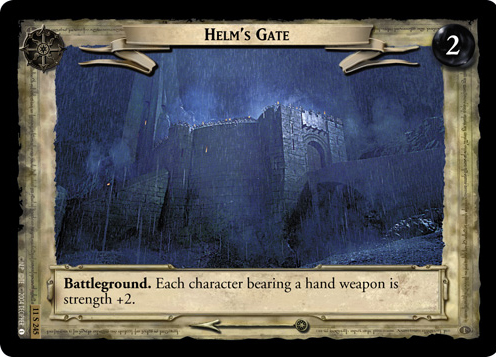 (previously 4U349) - Because allies had been retired after set 9, the new version benefits all characters instead of specifying companions and minions only.
(previously 4U349) - Because allies had been retired after set 9, the new version benefits all characters instead of specifying companions and minions only. - Moria Stairway (11S248)
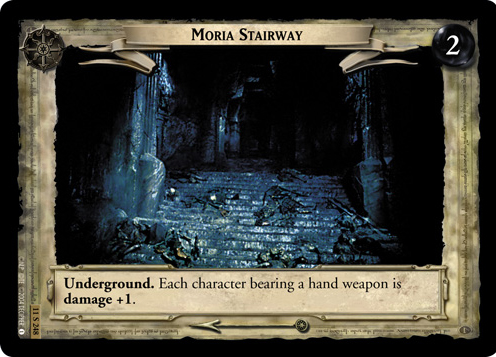 (previously 1U347) - Because allies had been retired after set 9, the new version benefits all characters instead of specifying companions and minions only.
(previously 1U347) - Because allies had been retired after set 9, the new version benefits all characters instead of specifying companions and minions only. - Pelennor Flat (11S254)
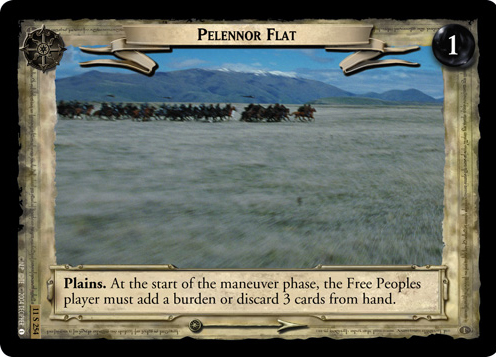 (previously 7U345) - Both versions give the free peoples player a choice between adding burdens or discarding cards, but the new version is a less severe choice (1 burden or 3 cards) than the original (2 burdens or their entire hand).
(previously 7U345) - Both versions give the free peoples player a choice between adding burdens or discarding cards, but the new version is a less severe choice (1 burden or 3 cards) than the original (2 burdens or their entire hand). - The Prancing Pony (11S256)
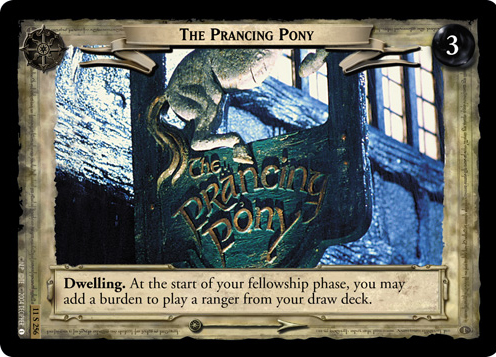 (previously 1U324) - This site changed significantly; it added the dwelling keyword, and allows you to play any ranger from your draw deck instead of just Aragorn.
(previously 1U324) - This site changed significantly; it added the dwelling keyword, and allows you to play any ranger from your draw deck instead of just Aragorn. - Slag Mounds (11S258)
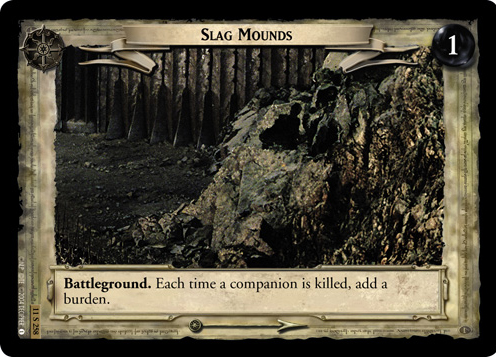 (previously 7U363) - Added the battleground keyword.
(previously 7U363) - Added the battleground keyword. - Stables (11S259)
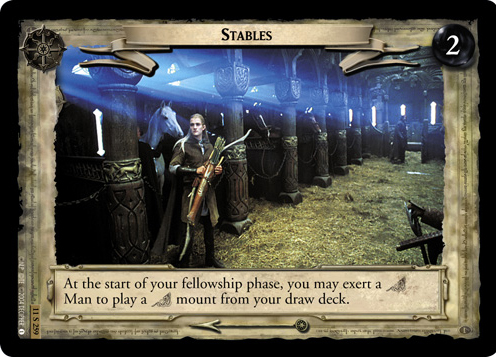 (previously 4U339) - The search must now happen at the start of the fellowship phase, rather than as a fellowship special action.
(previously 4U339) - The search must now happen at the start of the fellowship phase, rather than as a fellowship special action. - Trollshaw Forest (11S260)
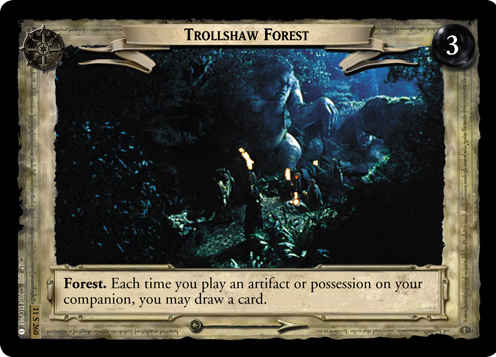 (previously 1U334) - The card draw is now optional.
(previously 1U334) - The card draw is now optional. - Valley of the Silverlode (11S261)
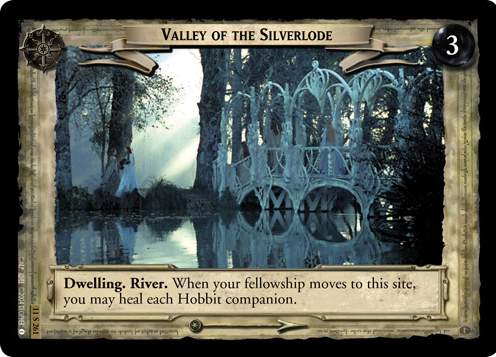 (previously 2U120) - Added the dwelling keyword.
(previously 2U120) - Added the dwelling keyword.
Notable Cards[edit]
- The One Ring, The Ring of Rings (11R1)
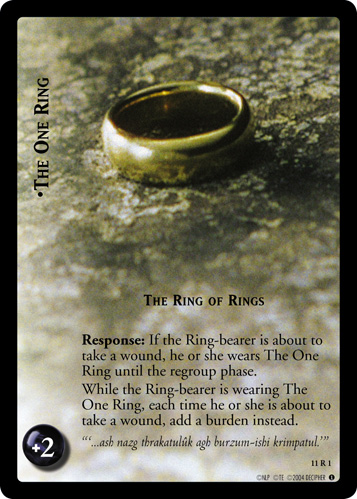
- Legolas, Companion of the Ring (11S21)
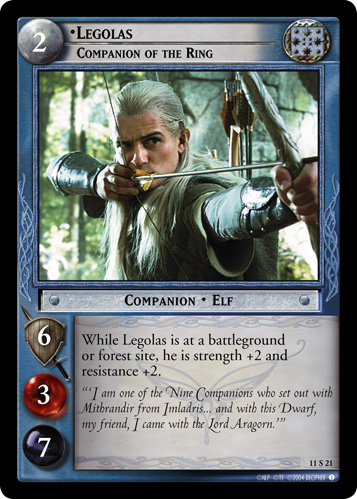
- Gandalf, Leader of the Company (11S33)
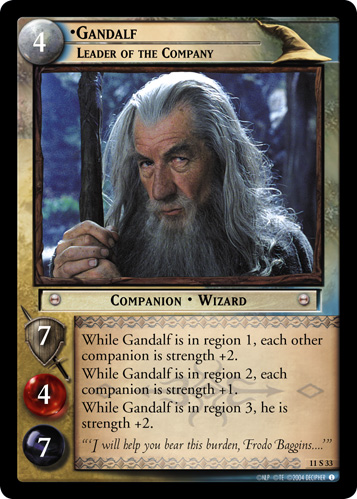
- Aragorn, Guide and Protector (11S53)
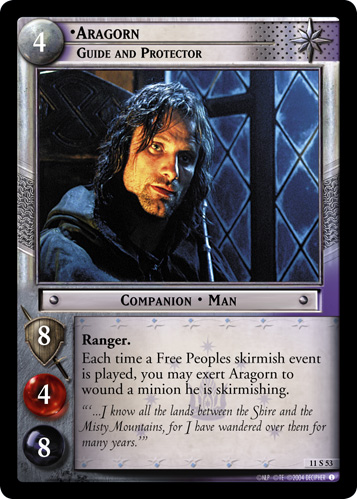
- Aragorn, Strider (11R54)
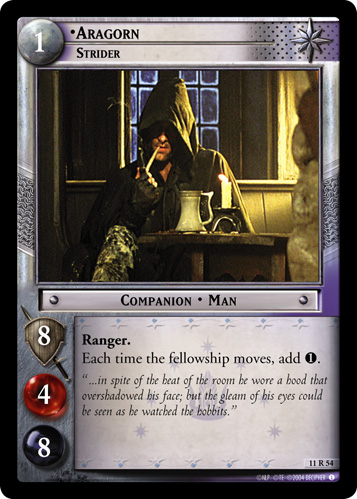
- Éowyn, Shieldmaiden of Rohan (11S146)
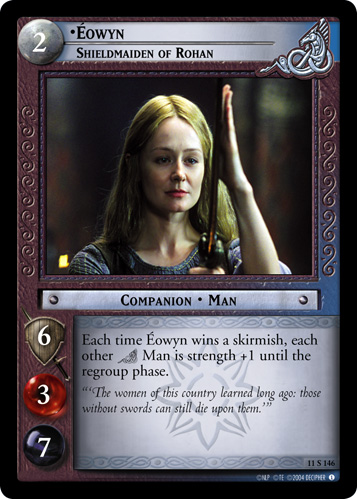
- Farmer Maggot, Hobbit of the Marish (11U163)
